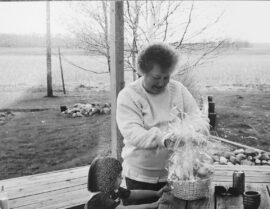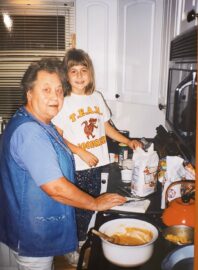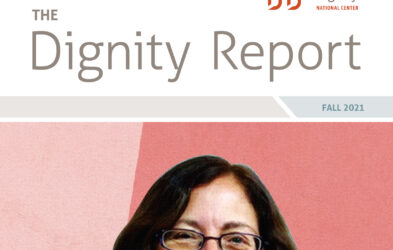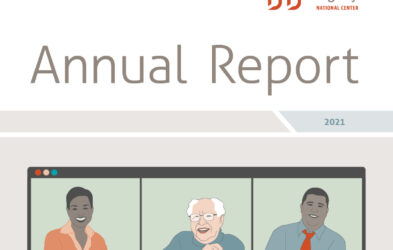Written by Emma Granquist, MSW
ANSWERING THE CALLS
As a social worker at Death with Dignity National Center, I have the privilege of working with a team that answers calls and emails from people wanting to gather more information about death with dignity laws. We hear from folks with terminal illness across the United States, as well as internationally, looking for information concerning end-of-life options. We also serve caregivers, loved ones, and medical providers hoping to gain a better understanding of this important option. Although anyone can go through the death with dignity process if they meet all the criteria confirmed by two physicians, I have observed a stark difference between those who reside in a death with dignity state, and those who do not.
HOPE AS A SPECTRUM
Elizabeth Kubler-Ross defines the five stages of grief as denial, anger, bargaining, depression, and acceptance.1 I’ve talked with patients with both recent terminal diagnoses and those nearing the end of their lives, as well as their family members, who exist in various stages within the cycle of grief. While I appreciate and have witnessed folks cycling between each stage of grief, I feel a distinct difference when discussing options with folks in states with death with dignity laws, and folks in states without them: hope. When discussing end-of-life options with folks who live in a state where medical aid in dying is legal, I often witness more hopeful reactions, a sense where they have the assurance of control and autonomy in choosing the circumstances in which they will face their final hours. On the drastic flipside, I can often feel a sense of palpable hopelessness exhibited by callers who will inevitably face the many barriers that come with accessing a death with dignity law while living in a state that does not yet have this option.
THE RELIEF OF LIVING IN A DEATH WITH DIGNITY STATE
Hope is palpable in the conversations with those who are easily able to access their state’s death with dignity laws. They are relieved in knowing they have an option for a peaceful death on their own terms, in the location of their choosing, and surrounded by those they love. A patient I will call Carla, located in Oregon, called because she had been diagnosed with stage IV brain cancer. She shared that prior to receiving this diagnosis, she always felt she wanted to alleviate herself and those around her from experiencing unnecessary pain and suffering while she was dying. She was and remains a supporter of the option for medical aid in dying. When discussing her decision to pursue death with dignity now that she was confirmed to be dying of something she feels will be very painful and degrading, Carla explained she was confident and hopeful in her decision, but also appreciated that she could change her mind at any point in the process about taking the medication, as it is not a requirement of the law. Just having this option gave her peace of mind, and a feeling of hopefulness that she would have total control over her death. Carla went on to tell me she has always been a planner, and it brought her immense comfort knowing she could plan to see her loved ones for the last time on her own terms.
RECEIVING DIFFICULT NEWS
In contrast, explaining to folks in states without a death with dignity law that they will not only not qualify in their home state, but accessing the law would involve many barriers, including moving out of state and establishing residency, is always one of the worst parts of my job. I can hear the deflation of hope through their silence, their deep breath, and their initial comments. Knowing they will not control their own death is often described as hopelessness and it is hard as a staff member at Death with Dignity to be the bearer of this difficult news.
THIS HOPELESSNESS IS ALL TOO PERSONAL

Emma and her grandma on Easter Day, 1994
Like most adults, we all know someone who has died or who is dying that we love very dearly. Currently, my grandmother is dying. She is 95 and resides in Minnesota. I believe my grandma would’ve wanted a more autonomous death than the one she is going through, as she is in constant pain, exhausted, and doesn’t want all of us to bear the continued grief involved in helplessly standing by while she continues to decline. She does not want us to remember her this way: in pain, suffering, and losing her dignity. Because she is in a state without this law, we don’t really have another choice, as she cannot move to another state at this point. I want to remember the best parts of my grandma’s life, not the painful months of suffering she has endured leading to her death.

Emma receiving baking lessons from her grandma, Thelma, in 1996
My grandma’s situation unfortunately is not unique, as barriers to the death with dignity laws, including residency requirements and being too sick to move to a legal state, are conversations I have with those who are dying and their family members on a weekly basis. These conversations are often difficult, and are a constant reminder of how necessary expanding the law to everywhere in the United States is.
HELP US EXPAND DEATH WITH DIGNITY ACROSS THE NATION
Without the option of death with dignity across the nation, hope dissipates. I can give countless examples on both sides of the hope spectrum. I am honored to do this work and I am committed to contributing to this movement to not only expand these laws, but promote hope for people both facing their own death and those who are a part of someone’s final journey. Death with dignity is less about death, and more about giving life and freedom to those last few months, days, and moments to yourself or a loved one.
Please join me in promoting more hope. We must turn out in numbers from every state to bring this law to those who don’t yet have access. Please sign up now to join this important movement.
1 The Five Stages of Grief (2021), https://www.psycom.net/depression.central.grief.html
If you or a loved one need to speak to one of our social workers, we are here and ready to support you.


No comments.